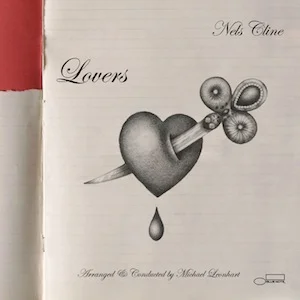Label: Blue Note Records, 2025
Personnel - Nels Cline: guitar; Ingrid Laubrock: tenor saxophone; Chris Lightcap: bass; Tom Rainey: drums.
In his latest album, Nels Cline—an astoundingly skilled guitarist and composer— leads a formidable new quartet featuring saxophonist Ingrid Laubrock, bassist Chris Lightcap, and drummer Tom Rainey. Consentrik Quartet, their self-titled release, is a testament to the strength of each musician’s abilities, and includes original compositions inspired both by the pandemic and the exciting improvisational Brooklyn music scene.
The vanguard side of Cline’s compositions blossoms into new vistas. “The Returning Angel” unfolds in a rubato form, layering enigmatic guitar arpeggios, brushed snare textures, scintillating cymbal work, and poised saxophone melodies. At a key moment, the bass locks in with the guitar, shifting into a slow 6/4 time feel before segueing into “The 23”, a fantastic amalgamation of rich tones and deftly chosen notes. Lightcap’s addictive bass groove casts a spell, Laubrock weaves through inventive trajectories, and Cline infuses mesmerizing harmonic colors, embracing jazz, rock, and blues with openness and fluency.
“Surplus” begins with sax and guitar in seamless communion before transitioning into odd-metered passages brimming with rhythmic intent. Cline’s phenomenal chordal sequence hints at a bluesy funk inclination, enhanced by a smeary overdrive effect. He repeats the feat on “Satomi”, written for bassist/singer Satomi Matsuzaki of the band Deerhoof, in a playful yet provocative avant-jazz-meets-post-rock setting that culminates in a less impetuous, chamber-like passage tinged with mournful tones.
“Slipping Into Something” hits all the right pleasure nodes, beginning with a hypnotic intro before settling into an unfaltering 15-beat cycle groove. Over this foundation, Cline and Laubrock exchange rapid-fire notes in a gripping dialogue, all laced with a sturdy rock feel that seamlessly carries over to “The Bag”. Written for Rainey, this piece showcases his drumming mastery—whether delivering intricate conversational textures, charging forward with a swinging drive, or providing sole support for Laubrock’s quick-witted improvisation. Eventually, Cline’s nimble guitar phrasing and Lightcap’s assertive bass conduction join the mix, reinforcing the piece’s momentum.
“Allende” suspends itself in an ethereal space, sprinkled with shimmering sonic particles, while “House of Steam” navigates an array of exciting meter signatures and rhythms. “Question of Mark” boils with plenty of noise, and “Time of No Sirens” offers a soothing counterpoint, imbued with emotional depth. No Matter the source of inspiration, Cline and his ensemble infuse the music with a fearless sense of perspective.
Consentrik Quartet is a truly collaborative ensemble, approaching music from unexpected angles and delivering an exhilarating listening experience. This album is a gem that should not be missed.
Favorite Tracks:
02 - The 23 ► 03 - Surplus ► 04 - Slipping Into Something ► 09 - The Bag












